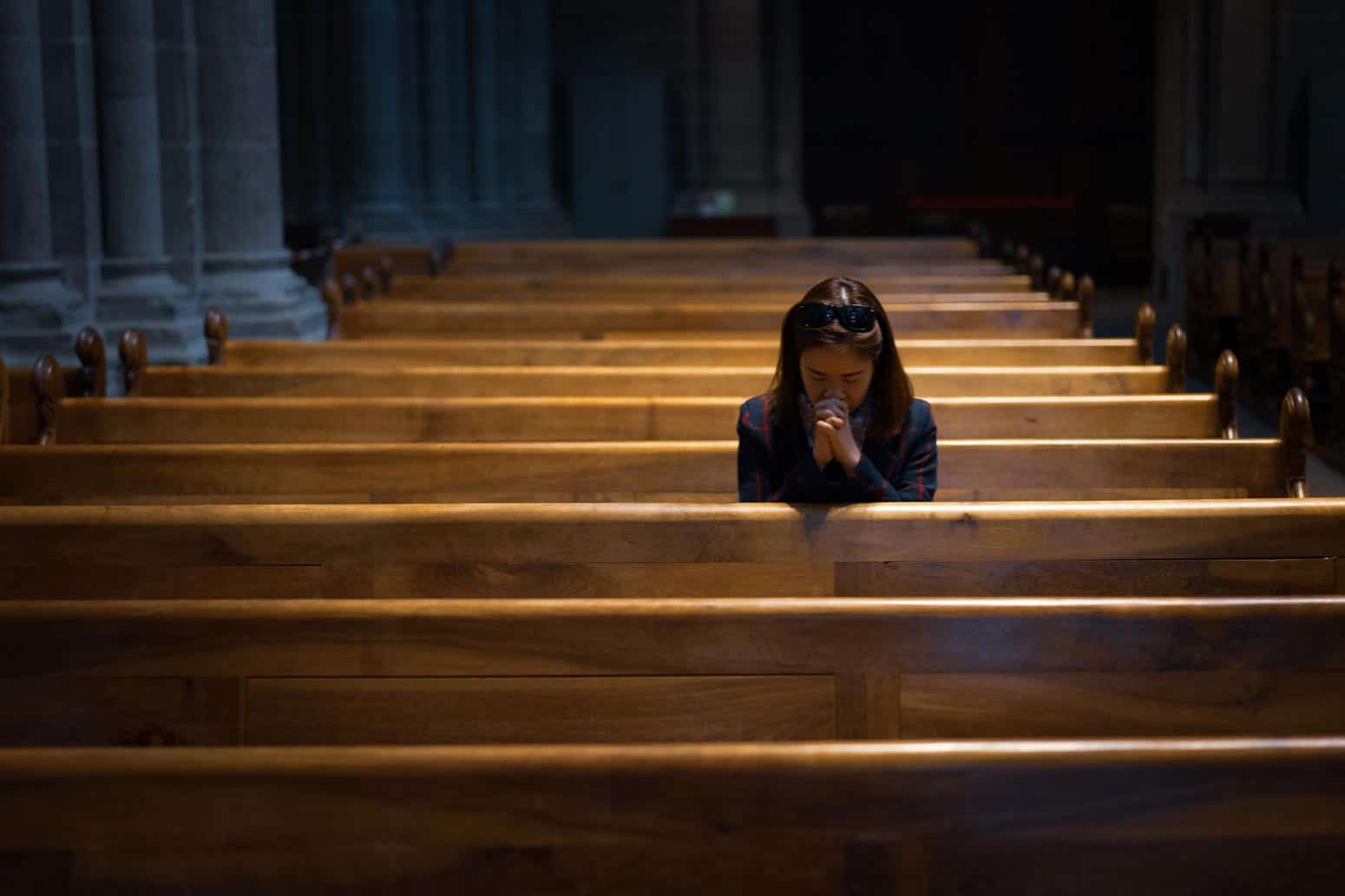It was a late Wednesday afternoon in September. My husband, daughter, and I had left the hospital in Montana, where my mom was fighting for her life. At my parents’ house, my husband was cooking, and my daughter was outside playing and visiting the horses. My dad’s text came through: “Doctors just left, they said probably hours.”
I kissed my husband and my daughter and immediately started the hour-long drive back to the hospital. Through sobs, I sang my way through most of Benjamin William Hastings‘ self-titled album. When I got there, I dried my eyes and walked into the hospital, loaded down with my dad’s guitar and his worship music binder. With more tears, my dad, little sister, and I worshiped through our sheer terror, waiting for my three other siblings to arrive from a few states away.
That was probably the most terrifying night of my life to date. My mother had battled cancer two other times before she was diagnosed again in 2020. And since that diagnosis, she had been in a pretty constant battle with just about every rare and unexpected side effect possible. I had thought that I’d come to terms with her mortality—but those moments were nothing compared to that night in the hospital room.
God gave her three more days. Three days for my siblings and their kids to all arrive, for my grandparents and uncle to make it to town. We wanted to believe in healing, but I think after that night, we knew that we were getting close to goodbye.
My mom died peacefully on a Saturday night, surrounded by her kids, her husband, her parents, and her brother. We each held on to her in some way as she took her final breaths. Although we wept with broken hearts, there was peace, as well. Because she was finally without pain or limitations. She could freely and fully praise her Lord.
In seasons of grief, we must discipline ourselves to praise based on what we know, not on what we feel.
Every day since, I’ve had to make a conscious choice to praise God for who He is, instead of waiting for feelings or circumstances to motivate praise. In seasons of grief, we must discipline ourselves to praise based on what we know, not on what we feel.
Let me take a moment to acknowledge that this is hard. Grief leaves us feeling overwhelmed with emotion and, often, by things we need to accomplish. Having one more thing to do may feel like it’s going to break you. I understand. Be gracious to yourself. But also know that choosing God in this season is the surest way to find comfort and peace.
“How Can I Keep From Singing Your Praise?”
I’d never heard Chris Tomlin’s song “How Can I Keep From Singing” until we moved from Missouri to Colorado. While it’s common to hear it on Sunday mornings now, I can’t say that I remember singing it in the few months we attended church before my mom died in the fall of 2024.
And now, I can barely sing the bridge and final chorus without crying.
It was sometime in those first few weeks after my mom’s death that I became conscious of these words in the bridge: “I can sing with my last breath, sing for I know that I’ll sing with the angels and the saints around the throne.”
What comfort that is for me, despite the tears—knowing that my mother is in heaven singing praise. And while I haven’t had to sing with my final breath yet, I have been able to sing through her last breath, knowing that I will join her one day in praising our God. That knowledge is hope.
When I focus on the hope we have in Jesus Christ, in eternity, I can feel the pain of loss while also praising the God of restoration. Although it feels like it’ll be forever before I am with my mom again, what I know is that God will sustain me until He makes all things new.
Grieving With Hope
Hope is essential to the Christian grieving process. Paul tells the Thessalonian church that we don’t sorrow or grieve like the rest of the world (1 Thessalonians 4:13). The world has no hope after death. But as Christians, we know that death is just a transition. We move from temporary to eternal. And that means we can expect a reunion with the believers who have gone on before. For all the joy we anticipate in seeing our loved ones again, our greater joy will be in joining them in worship before the very throne of God.
I’ll be honest, I don’t always feel overly hopeful. Hope is hard to define. Often it is portrayed as a joyful expectation and optimistic perseverance. A heroine’s montage, with upbeat music, showing her putting in the work and seeing the gains and desired outcome.
But that’s not how hope feels for me lately.
Most days, hope is simply getting up and getting on with the day. It’s doing what needs to be done because there’s no other option. Hope is being battered and bruised, but choosing to praise God anyway, in the small ways I’m capable of at a given moment, knowing that there will be something better, in this life or the next.
Daily life in this season of grief has a whole lot of feelings. Focusing on them overwhelms and paralyzes me. Even trying to feel hopeful is a lot. But what I know is that God is my comfort, my strength, and my refuge (Psalm 32:7, Psalm 18:1-3). That is reason to hope and praise.
Persevering for the Ultimate Good
My Christian hope is not confidence that God will give me what I want. I’m already acutely aware that his ways are not my ways. Christian hope is the confidence that God doesn’t waste anything, so even something heartbreaking or bad can serve an ultimate good purpose (Romans 8:28). But the Bible doesn’t say that God will work all the hard things in my life together for my good.
What I mean by that is, I get discouraged if I look at my life since my mom’s death, trying to pinpoint some personal benefit. It’s disheartening to do that. But if I consider that perhaps God is using it for good in someone else’s life, in some way I may never see, well, that feels a little different. Maybe her faith left a lasting impact on some of her nursing staff and will lead to salvation. Maybe, having seen her situation, one of her doctors will be better able to treat another patient, who will get to live.
If I focus on trying to find something good for myself out of my mom’s death, I get a yucky feeling about myself. Because how could anything I gain be worth the loss? I will never think about her death and think it was good.
I don’t understand God’s plan right now. But I know that my mom is OK, that we’ll be reunited, and that God is giving me new life in this season. As much as my mind wants to reach a point of equal exchange—give up this and get that in return—I don’t think that’s always how it works. I don’t think this new life depended on my mother’s death. A catalyst is not the same as a contingency.
But whether it had to happen or not, I choose to hope because, without hope, the world is just too heavy. With hope as a balm to my heart, I can continue to praise God (through the tears, many days), knowing that God is good and He has great joy ahead for us all.
I choose to hope because, without hope, the world is just too heavy.
“We are hard-pressed on every side, yet not crushed; we are perplexed, but not in despair; persecuted but not forsaken; struck down, but not destroyed” (2 Corinthians 4:8-9).
Life doesn’t stop for grief. Chaos continues and our enemy attacks while we’re already weary. But what I’ve experienced, as I’ve thrown myself at God’s feet in order to survive, is that I am not crushed, I’m not in despair, I’m not forsaken, and I’m anything but destroyed. I feel a lot of things in the course of a day. But what I know is that my God is faithful and unchanging. I choose to praise the God that I know, regardless of what I feel.
—
If life feels bleak and you’re wondering when God will come through, listen to this podcast episode for some encouragement in biblical truth: If Hope Feels Beyond Your Reach – 271












